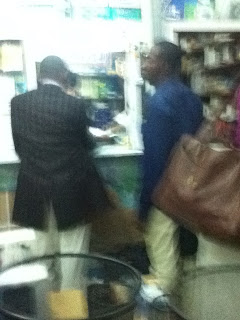Thursday, March 31, 2011
PEOPLE GETTING TO WORK IN AM
Wednesday, March 30, 2011
A TRIP TO PAPER STORE - NOT A STAPLES
 I took the pictures secretly with my iPod, sometimes people don't like you to take pictures, so they may be a little blurry.
I took the pictures secretly with my iPod, sometimes people don't like you to take pictures, so they may be a little blurry.Trip to “paper” store – not your usual trip to Staples. They call them “paper” stores here.
Yesterday we went with Marda the S&I office secretary to get a few supplies – we needed a printer cartridge and a few other items. It was an unusual experience to say the least. So glad we were with a native Congolese. She showed us the ropes.
It felt like we were buying illegal lottery tickets or something. We went to two shops looking for the cartridge – they were within a few blocks of each other. One was off the Boulevard and we would never go there by ourselves – too much street activity and roaming “vendors.” Both shops were set up the same. Small shop – perhaps 10 – 12 feet wide – not much deeper. Displays hung on the walls – most items behind glass – all for display not for purchasing – e.g. plastic pouches hung with thumb tacks, scissors in a glass covered shallow cabinet – I think you can see the displays in the picture. We needed some binders for each of the five stakes with whic

h we are starting. There were several types hanging on the wall with handwritten tags with the price.
If you wanted something a clerk, sitting at a table in the middle of the store, started a hand written “tab” – one of those receipt books that you saw before the day of the computer. You pointed to the item, told him the quantity. Once our purchases were listed we went up to a barred window – think tight security bank – and presented our “receipt. The picture of the “pay window” is blurry but I think you can get an idea of how it was. They pulled the items, bagged them and took your money. Then they stamped your receipt “paid.”
The prices were not unreasonable – perhaps double the US – HP color cartridge for $30.00. They just did not have a lot of selection. A side note – they do not use three ring binders. They use two ring binders. I couldn’t figure out why the paper punches on display only had two punches. Then we went looking for the binders and figured it out. Another side note – printer paper is a little different – it is called a 4A (210 X 297mm) on my printer selection and is about 1/2 inch longer.
Tuesday, March 29, 2011
OUR COLLEAGUE AND FRIEND DIDIER

Monday, March 28, 2011
SOME KINSHASA STORE FRONTS




 While traveling the city Saturday, we saw some cool shops and stuff. Suzanne was snapping pictures out of the window.
While traveling the city Saturday, we saw some cool shops and stuff. Suzanne was snapping pictures out of the window.Sunday, March 27, 2011
OUR FAVORITE PRIMARY CHILD
 This is our bishop's daughter. I don't think that is actually snot on her nose. She had just finished a banana and I think she was a little messy.
This is our bishop's daughter. I don't think that is actually snot on her nose. She had just finished a banana and I think she was a little messy.Children are always a hoot
 This is an activity of the Kasabubu Ward (the ward we attend). The kids are having a snack. In the background are kasava plants that are part of the ward garden. Kavava is an important part of the Congolese diet.
This is an activity of the Kasabubu Ward (the ward we attend). The kids are having a snack. In the background are kasava plants that are part of the ward garden. Kavava is an important part of the Congolese diet.